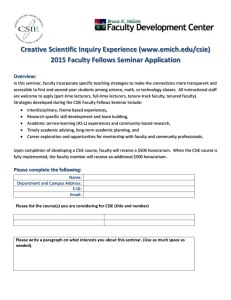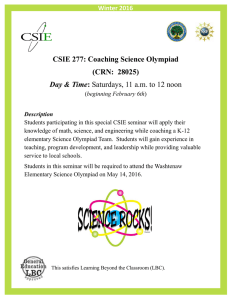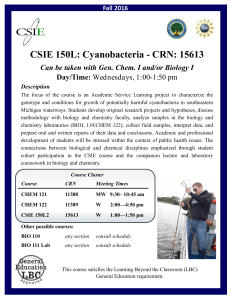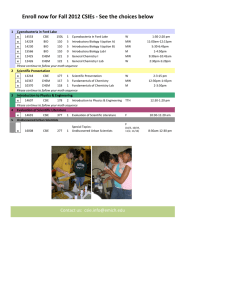EASTERN MICHIGAN UNIVERSITY Creative Scientific Inquiry Experience (CSIE) Program:
advertisement
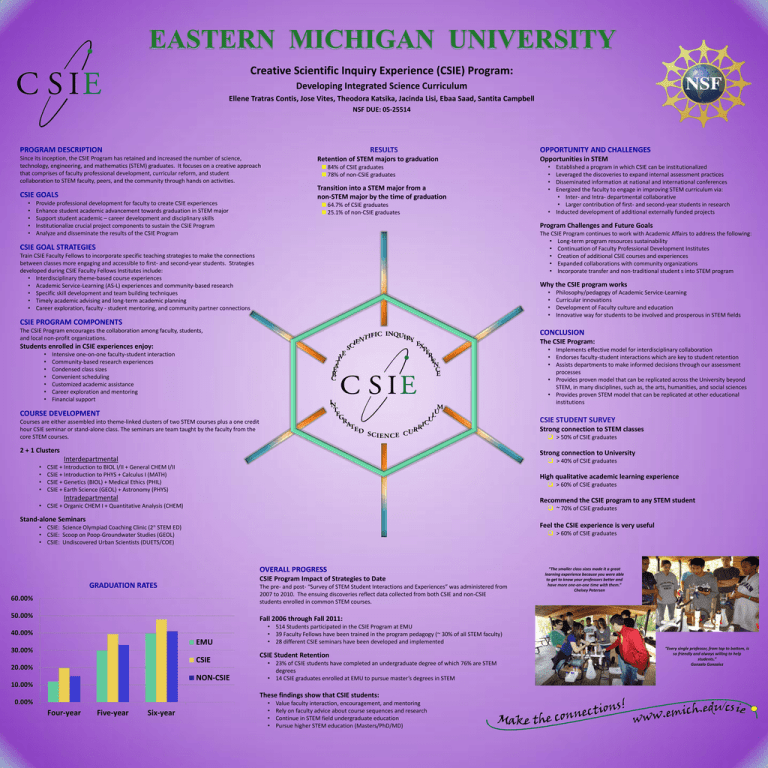
EASTERN MICHIGAN UNIVERSITY Creative Scientific Inquiry Experience (CSIE) Program: Developing Integrated Science Curriculum Ellene Tratras Contis, Jose Vites, Theodora Katsika, Jacinda Lisi, Ebaa Saad, Santita Campbell NSF DUE: 05-25514 PROGRAM DESCRIPTION RESULTS Since its inception, the CSIE Program has retained and increased the number of science, technology, engineering, and mathematics (STEM) graduates. It focuses on a creative approach that comprises of faculty professional development, curricular reform, and student collaboration to STEM faculty, peers, and the community through hands on activities. Retention of STEM majors to graduation 84% of CSIE graduates 78% of non-CSIE graduates Transition into a STEM major from a non-STEM major by the time of graduation CSIE GOALS • • • • • Provide professional development for faculty to create CSIE experiences Enhance student academic advancement towards graduation in STEM major Support student academic – career development and disciplinary skills Institutionalize crucial project components to sustain the CSIE Program Analyze and disseminate the results of the CSIE Program 64.7% of CSIE graduates 25.1% of non-CSIE graduates OPPORTUNITY AND CHALLENGES Opportunities in STEM • • • • Established a program in which CSIE can be institutionalized Leveraged the discoveries to expand internal assessment practices Disseminated information at national and international conferences Energized the faculty to engage in improving STEM curriculum via: • Inter- and Intra- departmental collaborative • Larger contribution of first- and second-year students in research • Inducted development of additional externally funded projects Program Challenges and Future Goals The CSIE Program continues to work with Academic Affairs to address the following: • Long-term program resources sustainability • Continuation of Faculty Professional Development Institutes • Creation of additional CSIE courses and experiences • Expanded collaborations with community organizations • Incorporate transfer and non-traditional student s into STEM program CSIE GOAL STRATEGIES Train CSIE Faculty Fellows to incorporate specific teaching strategies to make the connections between classes more engaging and accessible to first- and second-year students. Strategies developed during CSIE Faculty Fellows Institutes include: • Interdisciplinary theme-based course experiences • Academic Service-Learning (AS-L) experiences and community-based research • Specific skill development and team building techniques • Timely academic advising and long-term academic planning • Career exploration, faculty - student mentoring, and community partner connections Why the CSIE program works • • • • Philosophy/pedagogy of Academic Service-Learning Curricular innovations Development of Faculty culture and education Innovative way for students to be involved and prosperous in STEM fields CSIE PROGRAM COMPONENTS The CSIE Program encourages the collaboration among faculty, students, and local non-profit organizations. CONCLUSION The CSIE Program: Students enrolled in CSIE experiences enjoy: • • • • • • • • Implements effective model for interdisciplinary collaboration • Endorses faculty-student interactions which are key to student retention • Assists departments to make informed decisions through our assessment processes • Provides proven model that can be replicated across the University beyond STEM, in many disciplines, such as, the arts, humanities, and social sciences • Provides proven STEM model that can be replicated at other educational institutions Intensive one-on-one faculty-student interaction Community-based research experiences Condensed class sizes Convenient scheduling Customized academic assistance Career exploration and mentoring Financial support COURSE DEVELOPMENT Courses are either assembled into theme-linked clusters of two STEM courses plus a one credit hour CSIE seminar or stand-alone class. The seminars are team taught by the faculty from the core STEM courses. CSIE STUDENT SURVEY 2 + 1 Clusters Strong connection to University Strong connection to STEM classes > 50% of CSIE graduates Interdepartmental • • • • > 40% of CSIE graduates CSIE + Introduction to BIOL I/II + General CHEM I/II CSIE + Introduction to PHYS + Calculus I (MATH) CSIE + Genetics (BIOL) + Medical Ethics (PHIL) CSIE + Earth Science (GEOL) + Astronomy (PHYS) High qualitative academic learning experience > 60% of CSIE graduates Intradepartmental Recommend the CSIE program to any STEM student • CSIE + Organic CHEM I + Quantitative Analysis (CHEM) ~ 70% of CSIE graduates Stand-alone Seminars Feel the CSIE experience is very useful • CSIE: Science Olympiad Coaching Clinic (2 STEM ED) • CSIE: Scoop on Poop-Groundwater Studies (GEOL) • CSIE: Undiscovered Urban Scientists (DUETS/COE) > 60% of CSIE graduates OVERALL PROGRESS CSIE Program Impact of Strategies to Date GRADUATION RATES 60.00% The pre- and post- “Survey of STEM Student Interactions and Experiences” was administered from 2007 to 2010. The ensuing discoveries reflect data collected from both CSIE and non-CSIE students enrolled in common STEM courses. 50.00% Fall 2006 through Fall 2011: 40.00% EMU 30.00% CSIE 20.00% NON-CSIE 10.00% • 514 Students participated in the CSIE Program at EMU • 39 Faculty Fellows have been trained in the program pedagogy (~ 30% of all STEM faculty) • 28 different CSIE seminars have been developed and implemented CSIE Student Retention • 23% of CSIE students have completed an undergraduate degree of which 76% are STEM degrees • 14 CSIE graduates enrolled at EMU to pursue master’s degrees in STEM These findings show that CSIE students: 0.00% Four-year Five-year Six-year “The smaller class sizes made it a great learning experience because you were able to get to know your professors better and have more one-on-one time with them.” Chelsey Petersen • • • • Value faculty interaction, encouragement, and mentoring Rely on faculty advice about course sequences and research Continue in STEM field undergraduate education Pursue higher STEM education (Masters/PhD/MD) “Every single professor, from top to bottom, is so friendly and always willing to help students.” Gonzalo Gonzalez
